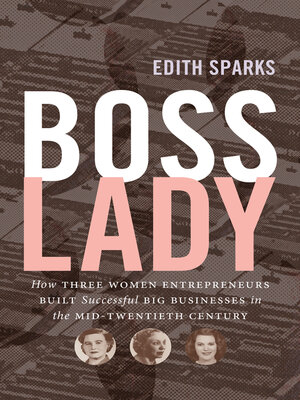Boss Lady
ebook ∣ How Three Women Entrepreneurs Built Successful Big Businesses in the Mid-Twentieth Century · The Luther H. Hodges Jr. and Luther H. Hodges Sr. Series on Business, Entrepreneurship, and Public Policy
By Edith Sparks

Sign up to save your library
With an OverDrive account, you can save your favorite libraries for at-a-glance information about availability. Find out more about OverDrive accounts.
Find this title in Libby, the library reading app by OverDrive.



Search for a digital library with this title
Title found at these libraries:
| Loading... |
Too often, depictions of women's rise in corporate America leave out the first generation of breakthrough women entrepreneurs. Here, Edith Sparks restores the careers of three pioneering businesswomen — Tillie Lewis (founder of Flotill Products), Olive Ann Beech (cofounder of Beech Aircraft), and Margaret Rudkin (founder of Pepperidge Farm) — who started their own manufacturing companies in the 1930s, sold them to major corporations in the 1960s and 1970s, and became members of their corporate boards. These leaders began their ascent to the highest echelons of the business world before women had widespread access to higher education and before there were federal programs to incentivize women entrepreneurs or laws to prohibit credit discrimination. In telling their stories, Sparks demonstrates how these women at once rejected cultural prescriptions and manipulated them to their advantage, leveraged familial connections, and seized government opportunities, all while advocating for themselves in business environments that were not designed for women, let alone for women leaders.
By contextualizing the careers of these hugely successful yet largely forgotten entrepreneurs, Sparks adds a vital dimension to the history of twentieth-century corporate America and provides a powerful lesson on what it took for women to succeed in this male-dominated business world.
By contextualizing the careers of these hugely successful yet largely forgotten entrepreneurs, Sparks adds a vital dimension to the history of twentieth-century corporate America and provides a powerful lesson on what it took for women to succeed in this male-dominated business world.






